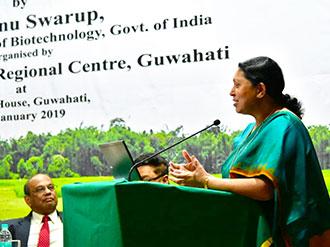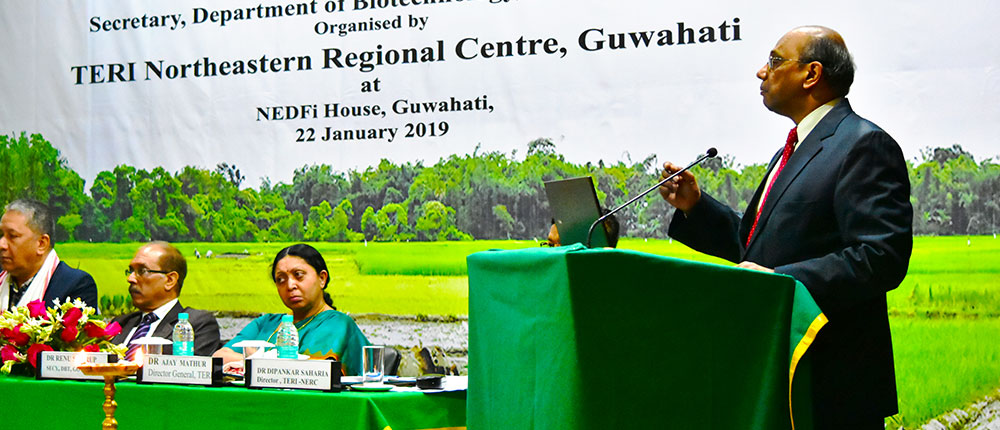Northeast India has the most potential for bio-economy: Dr Renu Swarup, Secretary, Department of Biotechnology, at TERI event

Her lecture was part of TERI's celebration of 25 years of its Northeastern Regional Centre in Guwahati
Guwahati, January 22: Northeast India has the maximum potential for bio-economy and the Eastern Himalayas can take the sector forward in the country, Dr Renu Swarup, Secretary, Department of Biotechnology (DBT), Ministry of Science and Technology, Govt of India, said on Tuesday.
She said this as part of a lecture on 'Driving the Bioeconomy Growth of Northeast: Creating Value from Bioresources' at NEDfi House in the city as part of the silver jubilee celebrations of the Northeastern Regional Centre of The Energy and Resource Institute (TERI), a leading New Delhi-based think tank dedicated to conducting research for sustainable development in India and the Global South.
"The DBT has been supporting TERI's work in this region since 1999 when the TERI North-eastern Regional Centre set up a tissue culture facility in Guwahati. Since then, TERI and DBT have worked together in many projects that have the same end goal of sustainably using the rich bioresources of the state to bring about the development of its people," she added.
Dr Ajay Mathur, Director General, TERI; Dr Mridul Hazarika, Vice Chancellor, Gauhati University; Dr Vibha Dhawan, Senior Director, TERI; Ranjit Barthakur, President and Founder Trustee, Balipara Foundation; and Dr Dipankar Saharia, Director, TERI Northeastern Regional Centre, also graced the event with their presence.

On the occasion, Dr Mathur said, "The silver jubilee is a significant landmark for the Centre, the achievements so far, and also for the next 50 years."
"Responsible commercialisation of bio-resources, encouraging horticulture, and scaling up watershed management in the region are three prime interventions that improve livelihood opportunities in the region. TERI's work in providing quality planting material to farmers, encouraging sustainable sericulture, and watershed management, to name a few, is an ex-ample of this," he added.
Over the years, the TERI Northeastern Regional Centre has conducted research and on-ground work in agriculture, biotechnology, and rural extension services in the region.
The Centre was set up in August 1993 in Guwahati. It established its Tissue Culture Facility in 1999 to distribute quality planting material to farmers in the North East. Species such as ba-nana, black pepper, citrus fruits, edible bamboo, cardamom, and horticultural plants were supplied directly to a large number of farmers under this initiative. With further support from the DBT, TERI has also set up grainage centres to supply disease-free layings of silk-worms to women. The women have also been trained in modern methods of sericulture, giving them an opportunity to increase their incomes.
TERI has also used its patented Oilzapper technology to reclaim vast stretches of oil-contaminated land in oil refining areas, especially Duliajan, Nazira, and Jorhat districts of Assam. However, its work has not been limited to one state. In the forests of Nagaland, TERI works closely with local communities and the Nagaland forest department to revive Com-munity Conserved Areas and help them document their rich biodiversity and build new eco-nomic opportunities through eco-tourism.
It has also set up 100 bio-toilets in the eight northeastern states. These toilets make use of an anaerobic digester to convert waste into gas and are easier to transport and maintain in remote locations. Dr Saharia, who gave the vote of thanks at the event, said, "We are celebrating the 25th year of the TERI Northeastern Regional Centre's journey and of our vision to meet the for-midable challenges in the way of sustainable development of the Northeast region. This is a significant milestone by any measure and is also a time to look back and thank every person who has contributed to our journey.
About TERI
The Energy and Resources Institute (TERI) is an independent, multi-dimensional organisation, with capabilities in research, policy, consultancy and implementation. It has pioneered conversations and action in the energy, environment, climate change, and sustainability space for over four decades.
The institute's research and research-based solutions have had a transformative impact on industry and communities. Headquartered in New Delhi, it has regional centres and campuses in Gurugram, Bengaluru, Guwahati, Mumbai, Panaji, and Nainital, supported by a multidisciplinary team of scientists, sociologists, economists and engineers, and state-of-the-art infrastructure.
For further information, contact:
TERI:
Aastha Manocha: aastha.manocha@teri.res.in
Edelman:
Swati Sharma: swati.sharma@edelman.com
Mehak Arora: Mehak.arora@edelman.com

